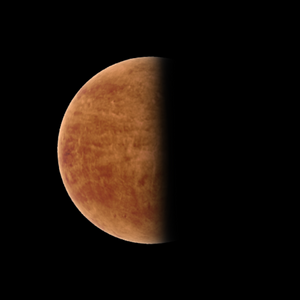Slahonus
 | |||||||||||||
| Orbital characteristics | |||||||||||||
|---|---|---|---|---|---|---|---|---|---|---|---|---|---|
| Epoch A2000 | |||||||||||||
| Aphelion | 0.34239 au (51221000 km) | ||||||||||||
| Perihelion | 0.23583 au (35280000 km) | ||||||||||||
| 0.28911 au (43250000 km) | |||||||||||||
| Eccentricity | ~0.1843014 | ||||||||||||
| 56.887 d (1.8690 months) | |||||||||||||
Average orbital speed | 55.396 km/s (34.421 mi/s) | ||||||||||||
| Inclination | 8.4001° | ||||||||||||
| Satellites | none | ||||||||||||
| Physical characteristics | |||||||||||||
Equatorial radius | 2967.3 km (1843.8 mi) | ||||||||||||
Polar radius | 2967.3 km (1843.8 mi) | ||||||||||||
| Flattening | 0 | ||||||||||||
| Circumference | 18644.284 km (11585.021 mi) (mean) | ||||||||||||
| 110,650,000km2 (42,722,200 mi2) | |||||||||||||
| Volume | 1.094425 × 1011 km3 | ||||||||||||
| Mass | 6.21108 × 1023 kg | ||||||||||||
Mean density | 5.6752 g/cm3 | ||||||||||||
| 4.708 m/s2 | |||||||||||||
| 5.286 km/s (3.285 mi/s) | |||||||||||||
Sidereal rotation period | 56.8873 d (1365.30 h) | ||||||||||||
Equatorial rotation velocity | 3.7933×10−3 km/s (2.3570×10−3 mi/s) | ||||||||||||
| 0.77516° | |||||||||||||
| Albedo | 0.0747 Bond | ||||||||||||
| |||||||||||||
| Atmosphere | |||||||||||||
Surface pressure | 2.3 nPa | ||||||||||||
| Composition by volume | hydrogen helium oxygen sodium magnesium | ||||||||||||
Slahonus is the closest planet to the sun in the Tendor System, with an extremely short orbit around the sun of 56.89 Anterian days, and boasts temperatures high enough to melt lead thanks to its extreme proximity to the sun. It has the highest eccentricity, the smallest axial tilt, and highest density of the six planets in the system.
Due to its extreme proximity with the Sun, it is tidally locked, meaning that the same side of the planet always faces either the Sun or out into space, which alongside its lack of a substantial atmopshere, contributes to it being the planet with the largest temperature difference of any planet in the Tendor System of over 650 degrees celcius.
A handful of exploratory and scientific probes has been launched from Anteria to explore the planet, though most were short-lived considering the temperatures present and the strong gravity of the Sun. There has been proposals for Slahonus to be the location of a handful of bases, specifically for the deployment of solar sails, though it would likely be a while before anything even lands on the planet.

